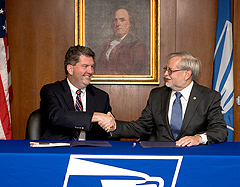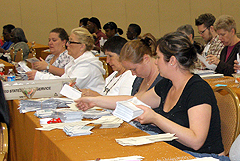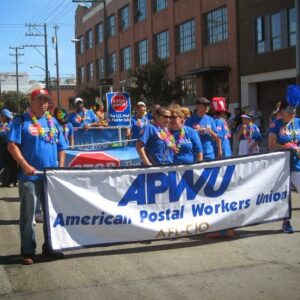December 20, 2025
APWU Members Ratify New Contract
(This article was first published in the July/August 2011 issue of The American Postal Worker magazine.)
APWU members approved a new contract may 11, with more than 75 percent of those casting ballots in favor of ratification. The final tally was 69,451 to 22,351 in voting that ended May 10. The agreement will expire May 20, 2015.
“The new contract is an important achievement for the APWU,” said President Cliff Guffey. “We were able to retain protection against layoffs, bring back thousands of jobs in each craft, and limit excessing. As we made clear from the start of bargaining, management’s proposal to eliminate our protection against layoffs was a ‘non-starter.’”
The contract also awards wage increases of 3.5 percent, as well as seven uncapped Cost-of-Living Adjustments. The first increase will take place in November 2012.
The agreement also includes several new concepts: The “full-time” designation will apply to any position of 30 or more hours per week and to any position of 48 hours or less per week. This will allow for the creation of a variety of fulltime schedules, including four 10-hour days, three 12-hour days, and four 11-hour days.

However, no current employee can be forced into a fulltime position of less than 40 hours per week or more than 44 hours per week. Furthermore, there will be no mandatory overtime for employees in non-traditional assignments or in functional areas that utilize non-traditional full-time assignments, except in an emergency.The new agreement also provides for the creation of new positions for non-career Postal Support Employees. These employees will have the opportunity to join the ranks of the permanent, career workforce by seniority. They will be part of the APWU bargaining unit, and will receive raises, health benefits, and leave.
Transitional Employees and Casuals will be eligible for conversion to Postal Support Employees if they have passed the appropriate tests and are on the register. “We have begun to spread the word among TEs and Casuals and encouraged them to take the necessary exams,” Guffey said.
“The agreement includes many big changes, and I realize that some union activists are apprehensive,” he added. “With help from the national union, I am confident that locals can implement the new provisions and protect the rights of APWU members.”
The Numbers
Ballots were mailed to 176,611 union members, and more than 50 percent were returned by the deadline.
“I wish more union members voted,” Guffey said, “but I am pleased that participation increased substantially over previous ratification votes.” Forty percent of eligible union members took part in the ratification process for the 2006-2010 contract.
The vote count was conducted by the American Arbitration Association on May 11 near Washington, DC, under the supervision of the Rank and File Bargaining Advisory Committee.Click here to see vote totals by individual locals [PDF].

Bargaining between the APWU and the USPS began Sept. 1, 2010, approximately 90 days prior to the expiration of the old contract on Nov. 20. The parties agreed to several extensions while negotiations continued.
On March 14, the union and management announced a tentative agreement. The Rank and File Bargaining Advisory Committee voted unanimously to endorse the agreement, as did the National Executive Board.
“I would like to thank the members of the union’s Negotiating Team: Greg Bell, Executive Vice President; Mike Morris, Director of Industrial Relations; Rob Strunk, Director of the Clerk Craft; Steve Raymer, Director of the Maintenance Craft; Bob Pritchard, Director of the Motor Vehicle Craft, and Bill Manley, Director of the Support Services Division,” Guffey said.
“Their dedication and invaluable assistance was crucial to our success. I would also like to thank the union’s other national officers and staff for their hard work and expertise throughout the process.
“I also appreciate the seriousness and dedication of the union’s Rank and File Bargaining Advisory Committee,” the union president added. “They worked diligently to represent the membership of the union and asked tough questions throughout negotiations.
“I want to thank everyone who made the effort to evaluate the agreement and vote. No matter which box you checked on your ballot, the union is stronger and better thanks to your participation,” he said.
Contest winners
Guffey has also announced the winners of the union’s voter participation contest. The challenge, intended to encourage participation in the ratification process, offered rewards to locals that were most successful in mobilizing APWU members to vote, regardless if members voted ‘yes’ or ‘no.’
The contest provided that the top three locals in several categories would be rewarded, with the categories based on the size of the local. The program stipulated that any local that achieved 100 percent participation would be rewarded, and to be eligible, locals must have reached voting levels of at least 50 percent.
Dealing with Disputes About Non-Traditional Jobs
The new Collective Bargaining Agreement allows for the creation of Non-Traditional Full-Time (NTFT) duty assignments in the Clerk Craft and MVS Craft. The unconventional schedules will be good for union members whose lives would be improved by a work week of other than five 8-hour days. On the other hand, there is the potential for management abuse if locals are not heavily involved when the assignments are created.
To prevent such abuse, the Collective Bargaining Agreement (p. 190) says that at the national level, the APWU and the USPS will oversee the implementation of NTFT staffing and assignments through regular bi-monthly meetings, which may occur more frequently if necessary.
In addition, before any new NTFT assignments are implemented, the local union must be given the opportunity to review, comment, make suggestions and propose alternatives. The contract also states that if disputes arise about NTFT assignments, the local union will refer them to the appropriate National Business Agent (NBA) who may meet with local, District or Area management representatives to settle the issue. If they are unable to come to agreement, the dispute will be referred to the national level.
In order to process these very important issues in a timely manner, the union will not add them into the regular grievance docket, which is already burdened with thousands of cases nationwide.
If the union cannot resolve these issues at the national level, the APWU can appeal the dispute to the appropriate arbitration docket within 30 days after the declaration of impasse.


